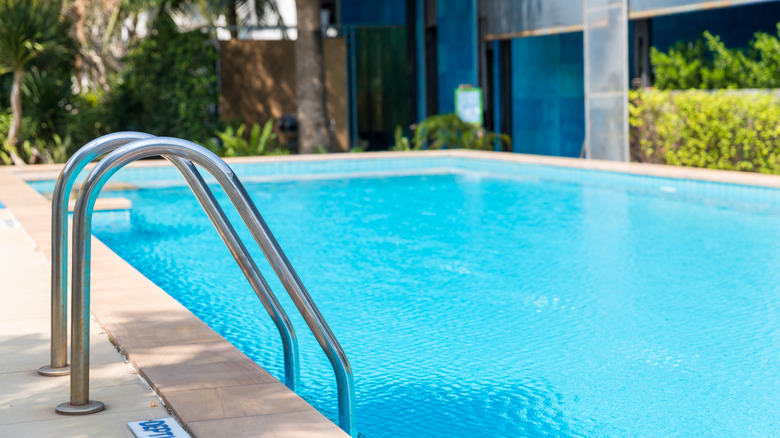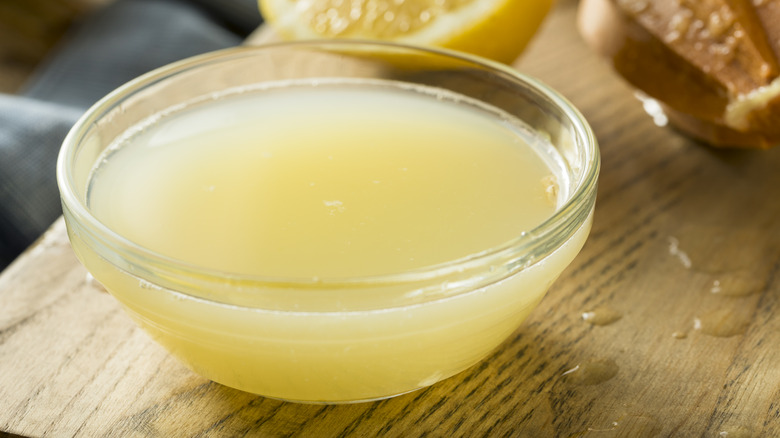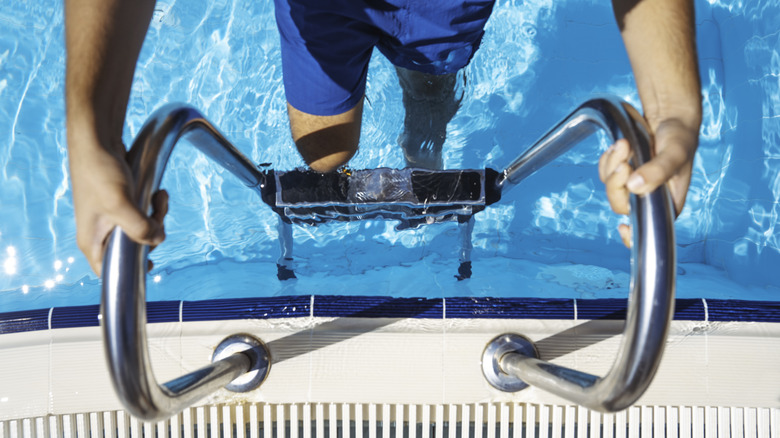Use These Common Ingredients To Easily Clean Your Metal Pool Fixtures
Summer is right around the corner, and you know what that means: more time spent in the outdoor pool area waiting to become a backyard oasis, enjoying the sunshine, and playing outside games with family and friends. Before you search for that perfect swimsuit for your first splash in the pool, you'll want to get your cleaning protocol straight to help keep your pool clean. Those metal fixtures can easily rust if they're not maintained properly. Get ready to grab some lemon juice and rubbing alcohol because it's time to clean your metal pool fixtures to ensure this summer is one for the books.
Besides the reality that you'll get an icky result from not cleaning your pool, metal products require consistent upkeep to remain shiny and new. Factors like oxidation, staining, corrosion, and rusting can all play a role in surface damage on metal objects. While stainless steel — which most outdoor metal products are made of — has protective layering, routine cleaning can help prevent any potential harm and increase the longevity of your pool's life. Rather than hope for the best, a few commonly used household ingredients can wash away your worries.
Try a lemon juice solution
Citric acid — found naturally in fruits like lemon — has an innate ability to clean off everything from grease and rust to fungi and bacteria, and it's a great alternative to odorous ingredients like vinegar. You only need two household ingredients to make this cleaning solution work. To start, measure a cup of lemon juice into a bowl and add enough salt until it creates a slurry. The consistency should look and feel like an ice slush. Once you've made the solution, grab a sponge to start cleaning.
You may soak the sponge in the solution before scrubbing away at the metal fixtures around your pool. Alternatively, pour the solution over the fixtures before using a wet sponge to clean the surface. Regardless of what you choose, the solution will work against the sponge's friction to break down any trace of buildup that's accumulated over time. Spend a few minutes scrubbing through every inch of the surface area before giving the fixture one final wipe-down. You should be met with shiny pool fixtures and the refreshing smell of lemon permeating the air. On the off chance that the solution didn't work completely, however, there's another option for you to try.
If that doesn't work, use rubbing alcohol
Buildup can be tricky, and sometimes citric acid just isn't enough to get through the most stubborn grime. If that's the case, rubbing alcohol is an effective alternative to lemon juice, especially in achieving the same shiny finish. You'll likely have rubbing alcohol — or isopropyl alcohol — sitting in a bathroom cabinet, which means it's time to whip it out and slightly dilute it with water. Use a sponge or wipe to clean each metal fixture until they appear shiny and new. Since rubbing alcohol is a natural disinfectant, it will easily tackle any bacteria on the metal fixtures around your pool.
Be extra careful not to mix rubbing alcohol with bleach, especially since pool water often contains chlorinated bleach. Combining bleach and rubbing alcohol can create chloroform, a colorless liquid highly toxic to the eyes, lungs, and liver. While both ingredients are effective cleaning agents, mixing the two can cause more damage than the accumulated rust and grime you're trying to remove. But as long as proper cleaning protocols are followed, your metal pool fixtures will be sparkling clean.


